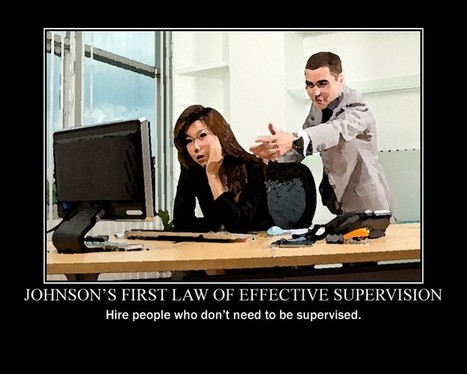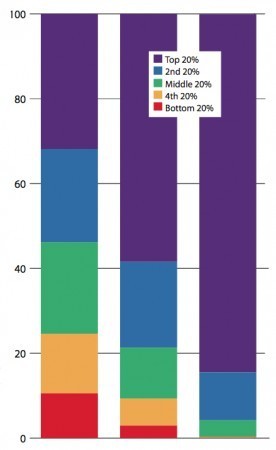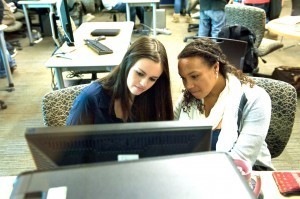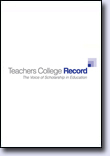 Your new post is loading...
 Your new post is loading...
Data suggest African American students are two to five times more likely to get suspended or expelled as their white peers and that the gap exists across the region's urban, suburban and rural school districts..."
"The problems extend beyond the Washington area to school districts across the country and are among a host of concerns about school discipline that sparked a joint effort by the U.S. Justice and Education departments in July to look into reforms.
Experts say disparities appear to have complex causes. A disproportionate number of black students live below the poverty line or with a single parent, factors that affect disciplinary patterns. But experts say those factors do not fully explain racial differences in suspensions. Other contributing factors could include unintended bias, unequal access to highly effective teachers and differences in school leadership styles."
At the International Charter School, teachers and an artist help third grade students document their culture and lives using photographs, writes Julia Steiny. Along the walls are the final exhibitions for “Documenting Cultural Communities,” an annual third-grade social studies project. Each child has chosen three of their own photographs, a self-portrait and two others that document a moment emblematic of their family’s culture. Each wrote two pieces about what we see in the pictures, one in English and one in Spanish. The displays open surprisingly clear windows into the kids’ hearts and homes. The author/photographers are supposed to be stationed next to their work to answer visitors’ questions. But they can manage it only for a moment, trying to be official for a question or two. The gravitational pull to their swarm of friends is too great. They’re proud, excited. Their families are beaming. They’re mostly dressed to the nines. One twirls in her glittery purple dress, making the fringe fly.
Here are few ideas for creating staff members who don't need supervision: Make sure everyone knows the big picture. The "why" of a project, especially in education, is often overlooked. We in education have the greatest mission in the world: making kids successful. If that is at the root of all our efforts, we naturally do our best. But everyone has to see the link - although sometimes long and nearly invisible - to one's work and its impact on students. (See also The DJ Factor.) Jointly set clear goals, establish time lines and help prioritize work. Then get the hell out of the way. Establish what needs to be done and let others figure out the best way to do it and the parameters under which they are working. Provide resources for success. The supervisor should be the go-to person if your staff needs training, equipment or cooperation from other people. See more here: http://goo.gl/P2x0d
These Technologies Are Changing Education. Are You Familiar With Them?
Via Gust MEES
Lawrence Lessig believes that money is the root of America's governmental problems. In this unedited, extended interview, Lawrence Lessig explores the corrupting influence of campaign funding on Congress.
"For the first time in the history of the prize, it is being awarded not to an individual, but to an idea. It is an idea upon which our planet’s future depends. The 2012 TED Prize is awarded to….the City 2.0. - The City 2.0 is the city of the future… a future in which more than ten billion people on planet Earth must somehow live sustainably. - The City 2.0 is not a sterile utopian dream, but a real-world upgrade tapping into humanity’s collective wisdom. - The City 2.0 promotes innovation, education, culture, and economic opportunity. - The City 2.0 reduces the carbon footprint of its occupants, facilitates smaller families, and eases the environmental pressure on the world’s rural areas. - The City 2.0 is a place of beauty, wonder, excitement, inclusion, diversity, life. - The City 2.0 is the city that works." >>> "Who will make and oversee this year’s TED Prize wish? The TED Prize organizing team is bringing together a group of visionaries — urban planners, architects, technologists, authors, policy makers, and economists — to act as advocates for The City 2.0 and craft a wish capable of inspiring collaborative action by many. The wish will be unveiled during the TED Prize session on February 29, 2012."
"Some states say they are are using multiple measures to evaluate student progress. But they are really just slicing and dicing the same standardized test scores — not using different kinds of measures." Examples of real multiple measures abound. Among many possibilities, they include science labs and field work, from short tasks to extended projects; oral presentations in any subject; extended math problems that require application to real world uses; and in-depth history reports, presented orally, in an essay, a PowerPoint, etc. The complex question is how to put these measures together plausibly and defensibly, but this has been done in the United States and other nations. (For more discussion and examples, see FairTest’s Multiple Measures fact sheet. (http://tinyurl.com/7z68b5p) Freed from the strictures of high-stakes testing, Finland (http://tinyurl.com/6gme85g) has achieved great success using true multiple measures. Finnish education (http://tinyurl.com/7mdgtoy) authorities periodically evaluate samples of students’ classroom work to determine the quality of teaching and learning in each school. The nation often ranks at or near first in various international comparisons (http://tinyurl.com/6s4of8r). From Australia to Singapore to England, nations have found ways to use performance tasks and classroom-based evidence to evaluate how well students are doing and to inform school improvement efforts.
One of the theories that gives great insight on the first question—how to be sure we find happiness in our careers—is from Frederick Herzberg, who asserts that the powerful motivator in our lives isn’t money; it’s the opportunity to learn, grow in responsibilities, contribute to others, and be recognized for achievements. I tell the students about a vision of sorts I had while I was running the company I founded before becoming an academic. In my mind’s eye I saw one of my managers leave for work one morning with a relatively strong level of self-esteem. Then I pictured her driving home to her family 10 hours later, feeling unappreciated, frustrated, underutilized, and demeaned. I imagined how profoundly her lowered self-esteem affected the way she interacted with her children. The vision in my mind then fast-forwarded to another day, when she drove home with greater self-esteem—feeling that she had learned a lot, been recognized for achieving valuable things, and played a significant role in the success of some important initiatives. I then imagined how positively that affected her as a spouse and a parent. My conclusion: Management is the most noble of professions if it’s practiced well. No other occupation offers as many ways to help others learn and grow, take responsibility and be recognized for achievement, and contribute to the success of a team."
Robert Redford urges President Obama to oppose the Keystone XL pipeline, which would deliver crude oil from Canada through the American heartland to refineries on the Gulf Coast of Texas.
Harvard Business School professor Michael Norton finds Americans prefer a more equal distribution of wealth. AMERICANS HAVE A DISTORTED sense of the level of inequality in their society—but not in the direction one might expect. Associate professor of business Michael I. Norton has found that respondents to his surveys universally think that wealth is more evenly distributed in the United States than it actually is—and what’s more, respondents say they would prefer for the wealth to be still more evenly spread around. More than 80 percent of the wealth in the United States belongs to 20 percent of the population; respondents estimated that this group held less than 60 percent of the wealth, and would in an ideal world hold about a third. The lowest two quintiles (a group with average net worth of $2,200) control 0.2 percent and 0.1 percent of the wealth, respectively. But respondents estimated that these groups held 6 percent and 3 percent, respectively, and said they would like them hold about 15 percent and about 10 percent instead.
While the world watched the demise of Qaddafi, some unsettling news from Wall Street helped explain why all those protests are resonating.
4) Finally, an idea from the blogosphere: U.S. congressmen should have to dress like Nascar drivers and wear the logos of all the banks, investment banks, insurance companies and real estate firms that they’re taking money from. The public needs to know.
Capitalism and free markets are the best engines for generating growth and relieving poverty — provided they are balanced with meaningful transparency, regulation and oversight. We lost that balance in the last decade. If we don’t get it back — and there is now a tidal wave of money resisting that — we will have another crisis. And, if that happens, the cry for justice could turn ugly. Free advice to the financial services industry: Stick to being bulls. Stop being pigs.
Excerpts from "Effective Teaching as a Civil Right: How Building Instructional Capacity Can Help Close the Achievement Gap," an article by Linda Darling-Hammond
Here are some quotes from Linda Darling-Hammond's article. You can read the whole article by clicking here: http://goo.gl/Gn6TA"...teacher knowledge and skills are closely related to teachers’ and schools’ capacity to support stu- dent learning..." "...I believe a capacity-building approach is critically important to promote effective teach- ing in all communities, particularly those where it is currently most lacking." "...it is important to consider both teacher quality – so that the system recruits the right people and prepares them effectively – and teaching quality – so that the most effective practices are encouraged and the most supportive conditions are provided." "Research has found that more-effective teachers gen- erally possess high verbal ability; strong content and pedagogical knowledge; an understanding of learners and learning; an ability to design useful curriculum, engaging learning tasks, and informa- tive assessments; and an ability and willingness to reflect on and improve their own practice.1" "Substantial evidence also points to the importance of class size, specific curriculum supports, the avail- ability of instructional supports such as tutoring, and the use of time as strong predictors of student achievement, along with factors like student attendance.2" "In one study, economists found that most value- added gains were attributable to teachers who were more experienced and better qualified, and who stay together as teams within their schools. The researchers found that peer learn- ing among small groups of teachers was the most powerful predictor of improved student achievement over time (Jackson & Bruegmann 2009)." "Dramatic inequalities in access to certified teachers have been docu- mented in lawsuits challenging school funding in California, Massachusetts, New Jersey, New York, South Carolina, and Texas, among other states (Darling- Hammond 2010b)." "In reading, for example, the negative effect on upper elementary students taught by underprepared novices has been estimated as the loss of about one-third of a grade level each year (Laczko-Kerr & Berliner 2002; Darling-Hammond et al. 2005)" "Focusing only on evaluating poor teachers out of the profession is unlikely to produce a highly effective teaching force if there are not equally strong efforts to develop a steady supply of effective teachers entering and staying in the profession and becoming more effective over the course of their careers." "Pre-service teacher preparation and mentoring enhance teacher effective- ness both by transmitting important knowledge and skills and by enabling teachers to stay in the profession and become more effective with experience." "Providing expert mentors to coach beginners also reduces beginning teacher attrition, with rates of leaving reduced from more than 30 percent of begin- ners to as low as 5 percent in some dis- tricts that have introduced high-quality programs." "There are, of course, substantial differences in the relative effectiveness of teacher education programs." "These reforms depend centrally on creating new models of clinical practice that are tightly integrated with coursework. Many successful schools of education have done this by creating professional development relationships with local schools, working with these sites to train novices in the classrooms of expert teachers. Highly developed models have been found to increase teacher effectiveness and retention, foster instructional improvement, and raise student achievement." "It is not surprising, then, that research shows that the same teacher typically looks more effective on value- added measures when she is teaching more advantaged students – and less effective when she is assigned more students who are low-income, new English learners, or who have special education needs (Newton et al., forth- coming). " "...two major U.S. studies have recently found that schemes pay- ing teachers based on their students’ test score gains do not raise student achieve- ment overall – a sign that this strategy does not build teachers’ capacity and effectiveness furthermore (Springer et al. 2010; Fryer 2011)" "Initiatives to measure and recognize teacher effectiveness have emerged as the press for improved student achievement has been joined to an awareness of the importance of teach- ers in contributing to student learning. Such initiatives will have the greatest pay-off if they reflect and stimulate the practices known to support student learning and are embedded in systems that also develop greater teacher com- petence through strong preparation and mentoring, coaching in relation to standards, and opportunities for teach- ers to help their colleagues and their schools improve. Policies that create increasingly valid measures of teacher effectiveness and develop innovative systems for recognizing, developing, and using expert teachers, while provid- ing incentives for them to work with the neediest students, can ultimately help create a more effective teaching profession that serves the nation’s chil- dren more equitably."
Deborah Meier and Diane Ravitch have found themselves at odds on policy over the years, but they share a passion for improving schools. Bridging Differences will offer their insights on what matters most in education.
The highlight of my trip was visiting schools in Finland. Of course, Finland is much in the news these days because of its success on the PISA (Program for International Student Assessment) examinations. For the past decade, 15-year-old Finnish students have consistently been at or near the top of all the nations tested in reading, mathematics, and science. And just as consistently, the variance in quality among Finnish schools is the least of all nations tested, meaning that Finnish students can get a good education in virtually any school in the nation. That's equality of educational opportunity, a good public school in every neighborhood.
What makes the Finnish school system so amazing is that Finnish students never take a standardized test until their last year of high school, when they take a matriculation examination for college admission. Their own teachers design their tests, so teachers know how their students are doing and what they need. There is a national curriculum—broad guidelines to assure that all students have a full education—but it is not prescriptive. Teachers have extensive responsibility for designing curriculum and pedagogy in their school. They have a large degree of autonomy, because they are professionals.
|
In today’s dynamic classrooms, the teaching and learning process is becoming more nuanced, more seamless, and it flows back and forth from students to teachers. Here’s a look at current trends in teaching and learning, their implications, and changes to watch for.
The Future of Teaching & Learning: Three Trends
1. Collaborative
2. Tech-powered
3. Blended
The politics, life and vision of the great Vaclav Havel, artist and freedom fighter. The great Czech artist, playwright, dissident, president, freedom fighter, philosopher Vaclav Havel died Sunday at 75. For anyone who lived through fall of the Berlin Wall and the end of the Soviet domination of Eastern Europe, Vaclav Havel was a hero of dizzying dimensions. The playwright in prison who insisted on the moral and real power of the powerless. Who earned real power as Czechoslovakia’s president in the Velvet Revolution. Who laughed and told the whole world that truth and love must prevail over lies and hate. This hour On Point: the life and vision of Vaclav Havel.
"As Czechoslovakia’s first democratically elected president after the nonviolent revolution that ended decades of repression, Vaclav Havel oversaw a bumpy transition to democracy and a free-market economy." "Shy and bookish, with wispy mustache and unkempt hair, Mr. Havel came to symbolize the power of the people to peacefully overcome totalitarian rule. “Truth and love must prevail over lies and hatred,” He famously said. It became his revolutionary motto which he said he strove to live by. Mr. Havel was nominated several times for the Nobel Peace Prize, and collected dozens of accolades worldwide for his efforts as a global ambassador of conscience, defended the downtrodden from Darfur to Myanmar. Among his many honors were Sweden’s prestigious Olof Palme Prize and the Presidential Medal of Freedom, the highest United States civilian award, bestowed on him by President George W. Bush for being “one of liberty’s great heroes.”"
Lawrence Lessig proposes that America implement a voucher system to fund Congressional campaigns. Lawrence Lessig explains why political transparency, while necessary, is not enough to fix America's government, in this unedited, extended interview.
A recent Times editorial called for changes to legal education. It argued for “apprentice-style learning” and “more courses that train students” for roles as “advocates and counselors, negotiators and deal-shapers, and problem-solvers” instead of a curriculum where professors grill “students about appellate cases.” Does the Socratic method still have a role in law school?
Anne Smith is at it again, this time having her all boys' class Skype with students in South Korea. " 'My all boys' class was matched up with Jeff's class in South Korea at the Korea International School. I knew that my all boys' class was going to be writing their "This I Believe" essays on something important to them, something they strongly valued. Jeff let me know early on that his class was going to be writing their essays with a slight twist to the assignment: "I Believe in Evolution...". To help you understand his requirements for their essays, Jeff is a science teacher, thus they were going to be writing about evolution.'"
The time difference between Colorado and South Korea is a bit of an issue, so the students in South Korea agreed to stay up late and Skyped our students from their homes. Read Anne's post for all the details, but this was another great opportunity for our students to connect and learn from/with other students."
"Recently, I [George Couros] had the opportunity to visit Minchau School with Edmonton Public Schools, to take a look at some of the work students were doing with green-screen technology and video creation. Although this was the main reason for my visit, I also really believe in looking at the culture of a school and seeing not only what people do, but how it feels. I was extremely impressed with the environment and culture that has been developed in this school; it was beyond powerful. No matter what technology, pedagogy, or teaching practice that you try to implement in your school, relationships and culture are at the forefront of any school being successful. As I walked into the school, the first thing that I noticed were teachers spending their own time getting together before school to do some work on learning how to use iPads. Now I am not sure if this was time that was designated, but what I knew for sure was that these teachers were extremely interested in what they were doing. As I, a stranger to all of them, sat down and offered a few tips, they were eager to listen and pick up anything that I was willing to share. They wanted to learn and they wanted to learn together. Something that we expect from our kids, but do we always model it in ways that they can see?"
In her work with UCLA's Graduate School of Education, Rebecca Alber assists teachers and schools in meeting students' academic needs through best practices. Alber also instructs online teacher-education courses for Stanford University.
"Twenty Tips for Creating a Safe Learning Environment
I visit a lot of classrooms. And I'm always fascinated by the variety of ways teachers launch the new school year and also with how they "run their rooms" on a daily basis. From these visits and my own experiences as an instructor, I'd like to offer my top 20 suggestions for keeping your classroom a safe, open, and inviting place to learn."
Consisting of rare footage filmed by President Richard M. Nixon’s aides, this experimental documentary revisits Nixon’s campaign to win an elusive majority.
We are becoming symbiotic with our computer tools, growing into interconnected systems that remember less by knowing information than by knowing where the information can be found. This gives us the advantage of access to a vast range of information—although the disadvantages of being constantly “wired” are still being debated. It may be no more that nostalgia at this point, however, to wish we were less dependent on our gadgets. We have become dependent on them to the same degree we are dependent on all the knowledge we gain from our friends and coworkers—and lose if they are out of touch. The experience of losing our Internet connection becomes more and more like losing a friend. We must remain plugged in to know what Google knows. A PDF of the article can be found here >> http://tinyurl.com/6zfygpo
Car sharing is on the rise! Explore this why access is better than ownership.
A car used to be the ultimate symbol of freedom and independence but increasingly consumers view ownership as an expense and a burden. Often considered the gateway to other forms of Collaborative Consumption, Car Sharing is becoming increasingly popular with its promise of personal convenience and social improvement. It is time to explore this new age where access is better than ownership.
Arendt’s biggest lessons about hope are that we all gain most when we are honest about the challenges we face and open to the unexpectedness of life. What can give us hope, then, are the concrete relationships with our students, our willingness to be there for them and to not be defined by the accountability culture that now saturates schools. If we believe our own claims to know the limits of what is possible, then we all will be constrained by those limits. The unexpected occurrences of our teaching can be merely annoying interruptions to our plans, or they can be surprises that, in our responses, take us where we might never have predicted. Our responses to the unexpected can either further entrench our own sense of powerlessness, or they can open up the unpredictability and possibility of our interactive lives for us and for our students. Arendt shows us how three common narratives of hope upon which teachers depend—hope through progress, hope through goal-directed action, and hope through rebirth—can be a source of frustration and hopelessness because they all misunderstand the unpredictable nature of the interactive lives we lead. Yet she also shows us that if, on the other hand, we affirm the unpredictability of our lives, we can find a renewed sense of possibility and hope in our teaching, and our students can reap the benefits of this hope as much as we can. As I spoke with my former student about his teaching in Alaska, he was just starting to come to this realization.
|



 Your new post is loading...
Your new post is loading...























